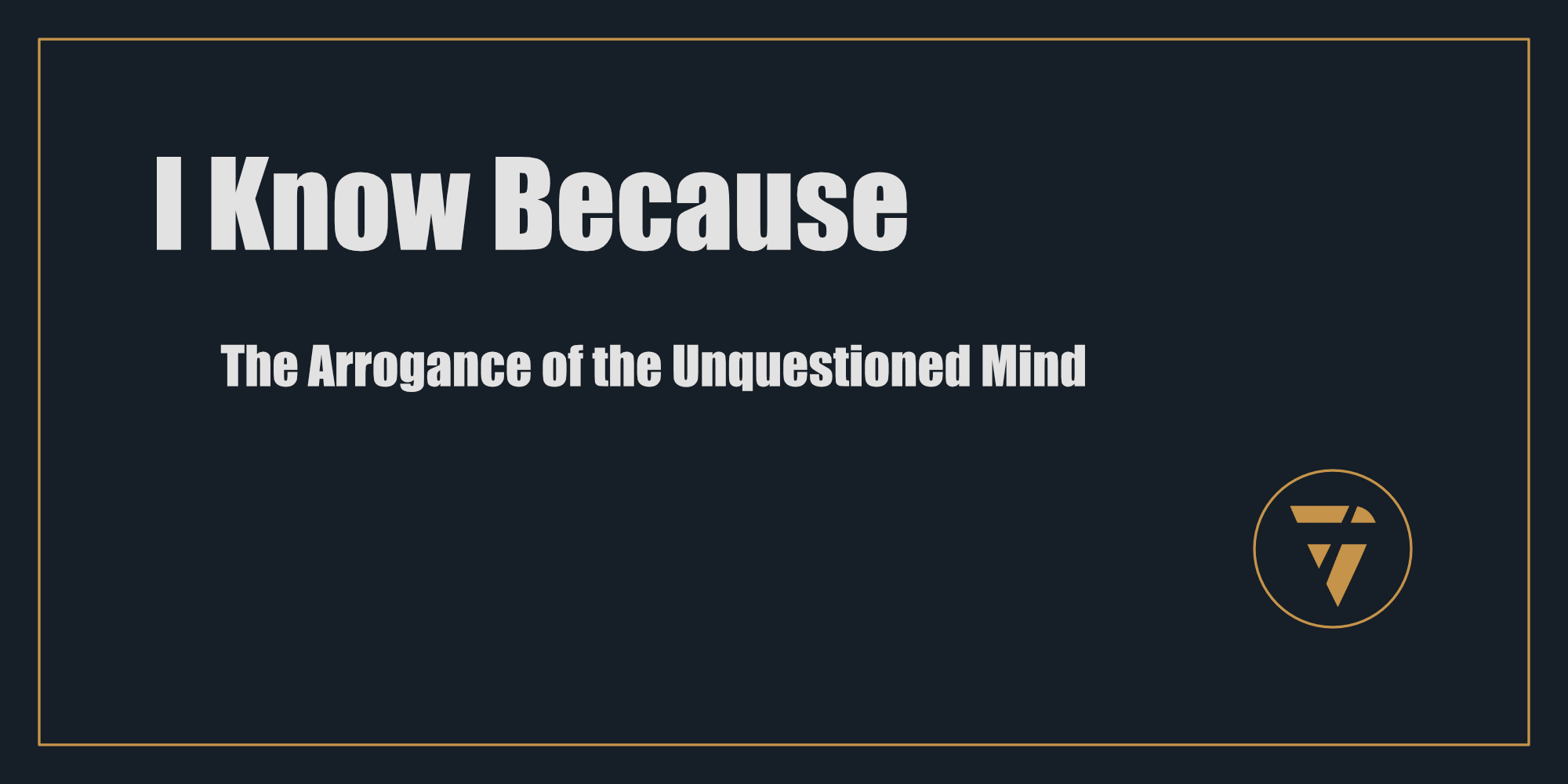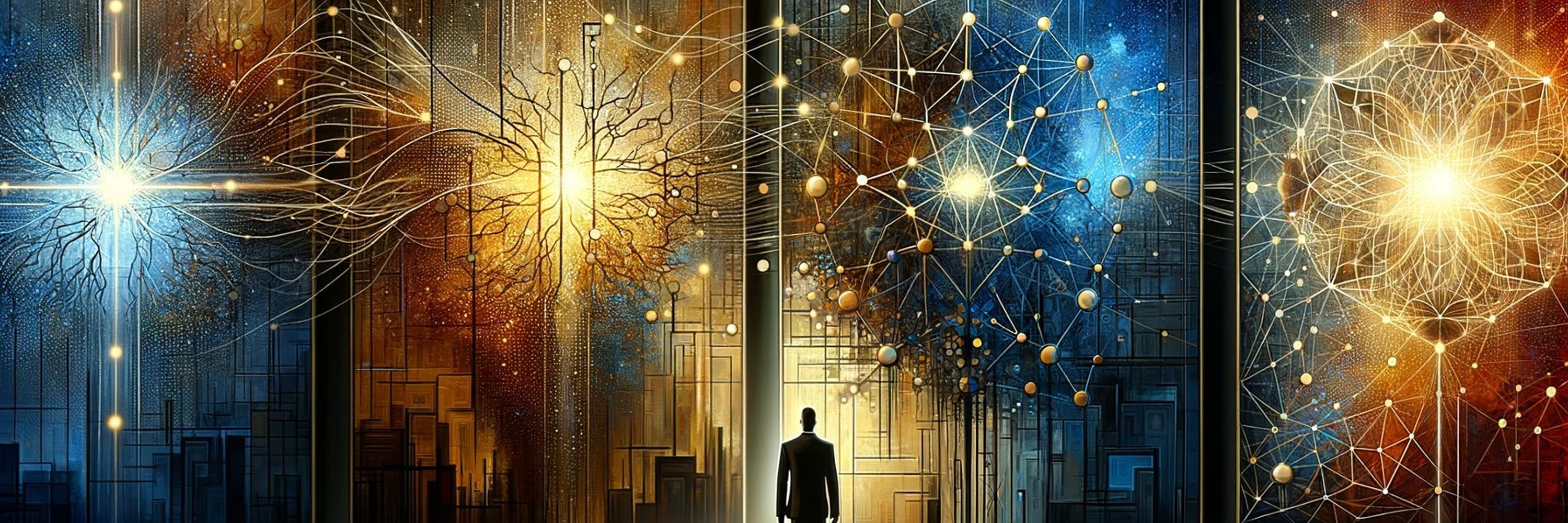I Know Because

The Arrogance of the Unquestioned Mind
There is a particular kind of ignorance that is worse than simple not-knowing... the certainty of the uninformed. It's the kind that comes wrapped in self-assurance, delivered with a smirk, and bolstered by the unwavering conviction that to question is to admit weakness. It's the arrogance of the unquestioned mind.
This arrogance has become the dominant force in political and cultural discourse. In the United States, it manifests in the rise of those who hold no expertise but insist they “just know” how the world works. It fuels the reactionary defiance of the Conservative base in Canada, where complexity is dismissed in favour of simplistic, populist outrage.
There is an epidemic of people who believe that feeling something deeply is the same as knowing it factually. They wield their opinions like weapons, sneering at dissent, and mistaking their stubbornness for strength.
This is not just a problem of misinformation. It's a problem of mindset.
The Lie of Certainty
People crave certainty. It's the ultimate comfort. Far safer than ambiguity, far easier than intellectual humility. The need to be certain overrides the need to be correct, and nowhere is this more evident than in modern political movements.
The most ignorant voices are often the most confident. This is not an accident. It is the Dunning-Kruger effect in full force: those with the least understanding lack the awareness to recognize their own ignorance. Instead of questioning themselves, they become even more certain.
They know because… well, because they just know.
- They know that climate change is a hoax, because they feel that it is.
- They know the election was stolen, because it seems obvious.
- They know vaccines are dangerous, because they read it on Facebook.
- They know that free markets solve everything, because they heard it once in a soundbite.
There is no room for doubt, no willingness to engage in nuance, no curiosity about the possibility of being wrong.
And worst of all—no shame in not knowing.
When Ignorance Becomes a Virtue
There was a time when ignorance was something to overcome, not something to defend. But today, ignorance has been rebranded as “common sense,” and expertise has been recast as elitism. The less someone knows, the more certain they become—and the more their certainty is celebrated.
This is particularly evident in the Conservative following in Canada, where any appeal to intellectualism is met with hostility. To suggest that a problem might require expert analysis is to invite accusations of being “out of touch.” Those who seek to understand issues in depth are dismissed as “overthinking” things.
It is the ultimate inversion: intelligence is seen as a flaw, while blind confidence is treated as leadership.
We saw this play out with Brexit in the UK. When Michael Gove famously declared, “I think the people of this country have had enough of experts,” he wasn’t just making an offhand remark—he was giving voice to an entire movement built on defiant ignorance. The same attitude has infected politics across the West.
The loudest voices no longer belong to those with the most knowledge. They belong to those with the least shame.
The Role of Media: Manufacturing Smug Ignorance
The modern media ecosystem thrives on the smugness of the uninformed. Entire networks exist to validate, rather than challenge, the beliefs of their audience. In the U.S., Fox News has mastered this formula. In Canada, conservative media outlets fuel a similar brand of outrage-driven ignorance, ensuring their viewers are perpetually angry but never truly informed.
Social media amplifies the problem. The algorithms reward certainty over curiosity, outrage over thoughtfulness. The most viral content is not the most insightful—it's the most emotionally charged.
The result? A generation of people who believe they are informed because they consume vast amounts of content, yet lack the critical thinking skills to separate fact from fiction. They are not educated; they are indoctrinated. And they wear their ignorance like a badge of honour.
The Consequences of Smug Ignorance
Smug ignorance is not just an annoyance. It's a force that actively corrodes society. It leads to:
- Political Paralysis: When people refuse to engage with facts, democracy breaks down. Policy is no longer about solving problems—it's about performing ideological loyalty.
- Economic Stagnation: Countries that devalue expertise and reject science fall behind. Nations that prioritize ideology over reality cannot compete in a global economy.
- Cultural Decline: The arts, education, and intellectual discourse suffer when people prefer comfortable lies over difficult truths. A society that scorns intellectualism is a society in decline.
- Deepening Division: When ignorance is celebrated, conversation becomes impossible. People no longer debate in good faith—they simply shout at each other across an ever-widening chasm.
Ignorance has consequences. And the longer we pretend otherwise, the worse those consequences will become.
The Antidote: Intellectual Humility
What is the way forward? How do we fight back against the rise of the unquestioned mind?
- Embrace Complexity. The world is not simple. It never has been. We must reject the idea that problems have easy solutions and demand deeper thinking.
- Celebrate Intellectual Curiosity. Changing your mind is not a weakness—it's a sign of growth. We must make learning aspirational again.
- Hold Media Accountable. We must stop rewarding propaganda with our attention. Seek out challenging perspectives. Read beyond the headlines. Demand more.
- Teach Critical Thinking. Schools should prioritize logic, reasoning, and argumentation. The goal is not to teach children what to think, but how to think.
- Encourage Civil Discourse. Disagreement is not the problem—bad faith engagement is. We must relearn the art of debate, where the goal is not to win, but to understand.
The real test of intelligence is not how much you know, but how much you are willing to learn.
The Choice Before Us
Ignorance is not a sin. But willful ignorance—the kind that is smug, defiant, and unquestioned—is.
We must choose. Do we want a world where certainty is prized above truth? Where expertise is dismissed, and the loudest voices belong to the least informed?
Or do we want a world where thoughtfulness is respected, curiosity is rewarded, and the ability to change one's mind is seen as a strength rather than a weakness?
The unquestioned mind is not strong—it is fragile. The truly strong mind is the one that is willing to doubt, to learn, and to grow.
So, the next time someone declares, “I know because,” ask them—how do you know?
If they cannot answer, they never knew at all.
This is what I’m working on. Tell me what you think, I enjoy the conversation! Subscribe and follow the work in real time.
Thanks!
B

"I know because." The most dangerous phrase in modern discourse. Certainty without knowledge. Confidence without understanding. The loudest voices belong to the least informed. Question everything—especially yourself.
PS -






